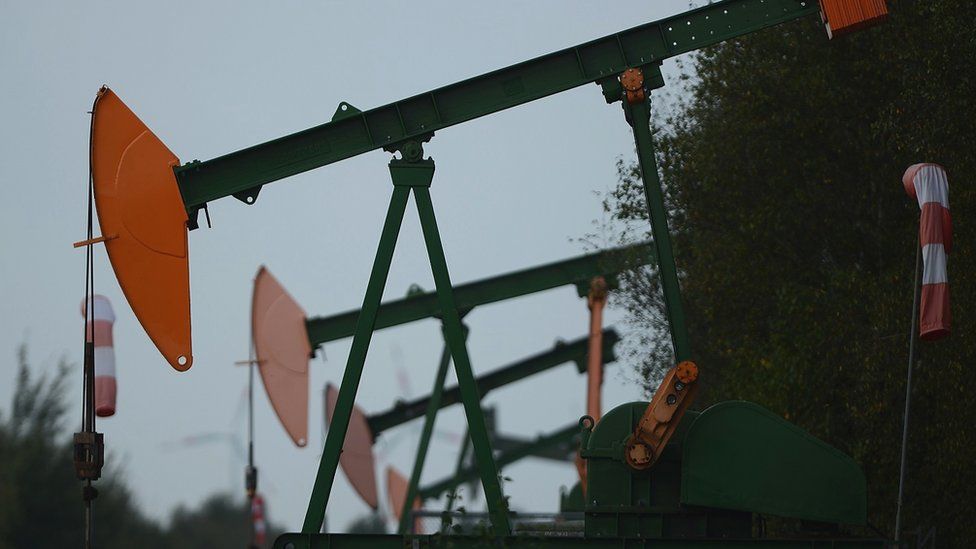RRONDO
JF-Expert Member
- Jan 3, 2010
- 51,719
- 107,835
Naangalia CNN naona bei ya Crude Oil USA imeshuka chini ya $0 actually ni $-37! Hii inakuwaje?
Kwanini tusinunue mafuta kutoka USA?

Oil is now cheaper than a cup of coffee as the market plummets.
For the first time ever, oil prices fell below zero on Monday, marking a historic new low for the fossil fuel. Oil prices have been falling since the beginning of the year and the onset of the coronavirus pandemic, but the April 20 price collapse is new, deeply uncharted territory. Some crude oil stocks dropped to about $40 below zero.
The coronavirus crisis has dramatically reduced fossil fuel usage around the world, causing prices to plummet and for storage tanks to fill up with unused oil. For the broader economy, it’s ravaged the stock market. Tens of millions of Americans have filed for unemployment.
As described by Bloomberg Business, the pandemic, plus a gradual breakdown in international petroleum agreements, led the oil market to plunge into this “unprecedented wipeout.” As Bloomberg reporters put it: “With no end in sight, and producers around the world continuing to pump, that’s causing a fire-sale among traders who don’t have access to storage.”
Some producers have been cutting back already — 13% of the American drilling fleet was shut down last week, according to Bloomberg. The head of commodities at banking and financial services company Standard Chartered told Bloomberg News that production cuts aren’t happening fast enough to avoid a surplus.
“People are trying to get rid of the oil and there are no buyers,” said Michael Lynch, president of the Strategic Energy and Economic Research group, to Bloomberg.
People were shocked on Monday to see prices per barrel fall from $12 to $4 to then $2, tweeting about how a cup of coffee or a roll of toilet paper were worth more than a barrel of crude oil. Before prices fell into negative territory, energy experts were cautioning people to look at the big picture:
A few days ago, President Trump credited himself with saving the oil industry, saying he had negotiated “maybe the biggest oil deal ever made.” Stocks closed down over 500 points on Monday as oil prices collapsed.
Climate advocates have called on the U.S. to take advantage of the crisis to make a fundamental shift to clean energy, but Trump and congressional Republicans have said they plan to push for a fossil fuel industry taxpayer bailout.
Source: Now This
===


Kwanini tusinunue mafuta kutoka USA?
Oil is now cheaper than a cup of coffee as the market plummets.
For the first time ever, oil prices fell below zero on Monday, marking a historic new low for the fossil fuel. Oil prices have been falling since the beginning of the year and the onset of the coronavirus pandemic, but the April 20 price collapse is new, deeply uncharted territory. Some crude oil stocks dropped to about $40 below zero.
The coronavirus crisis has dramatically reduced fossil fuel usage around the world, causing prices to plummet and for storage tanks to fill up with unused oil. For the broader economy, it’s ravaged the stock market. Tens of millions of Americans have filed for unemployment.
As described by Bloomberg Business, the pandemic, plus a gradual breakdown in international petroleum agreements, led the oil market to plunge into this “unprecedented wipeout.” As Bloomberg reporters put it: “With no end in sight, and producers around the world continuing to pump, that’s causing a fire-sale among traders who don’t have access to storage.”
Some producers have been cutting back already — 13% of the American drilling fleet was shut down last week, according to Bloomberg. The head of commodities at banking and financial services company Standard Chartered told Bloomberg News that production cuts aren’t happening fast enough to avoid a surplus.
“People are trying to get rid of the oil and there are no buyers,” said Michael Lynch, president of the Strategic Energy and Economic Research group, to Bloomberg.
People were shocked on Monday to see prices per barrel fall from $12 to $4 to then $2, tweeting about how a cup of coffee or a roll of toilet paper were worth more than a barrel of crude oil. Before prices fell into negative territory, energy experts were cautioning people to look at the big picture:
A few days ago, President Trump credited himself with saving the oil industry, saying he had negotiated “maybe the biggest oil deal ever made.” Stocks closed down over 500 points on Monday as oil prices collapsed.
Climate advocates have called on the U.S. to take advantage of the crisis to make a fundamental shift to clean energy, but Trump and congressional Republicans have said they plan to push for a fossil fuel industry taxpayer bailout.
Source: Now This
===




